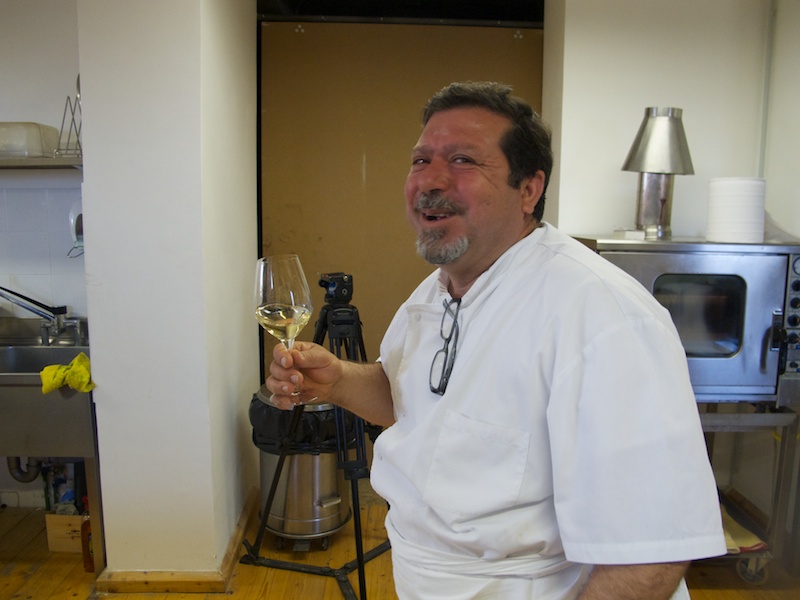 At some point our readers must think we make this stuff up. You simply can’t have a day like yesterday, let alone on the heels of dozens of days just like it. But that’s our life in Italy. Not the life of Reilly, exactly. More like the life of Roberto.
At some point our readers must think we make this stuff up. You simply can’t have a day like yesterday, let alone on the heels of dozens of days just like it. But that’s our life in Italy. Not the life of Reilly, exactly. More like the life of Roberto.
Our day began at the Arnaldo Caprai vineyard, the landing spot of Salvatore Denaro, one of Umbria’s best known chefs. Several years ago Salvatore closed his popular restaurant in Foligno, il Bacco Felice, and went to work for Caprai’s owner, Marco. For the past several years Salvatore has used the Caprai winery as a base of operations to run his cooking school and appears at events on behalf of the winery around the world. It is a relationship that benefits both the chef and the vintner. And, as we learned yesterday, it is a relationship that they both appear to cherish.
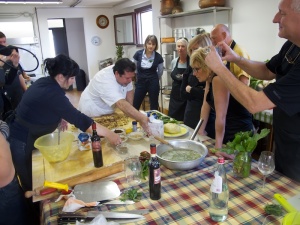 We arrived at Caprai a half hour late for our cooking class. Not a problem, as Salvatore, notorious for being less than precise when it comes to time, was not yet ready for us. After a few minutes poking around the cantina and winetasting room we were led upstairs to the kitchen/classroom where we have taken a number of classes in the past. It is a beautiful space – roomy, well equipped and with some spectacular views over the Umbrian countryside. Outside the weather was absolutely perfect. There was nothing you could change about it that would improve it.
We arrived at Caprai a half hour late for our cooking class. Not a problem, as Salvatore, notorious for being less than precise when it comes to time, was not yet ready for us. After a few minutes poking around the cantina and winetasting room we were led upstairs to the kitchen/classroom where we have taken a number of classes in the past. It is a beautiful space – roomy, well equipped and with some spectacular views over the Umbrian countryside. Outside the weather was absolutely perfect. There was nothing you could change about it that would improve it.
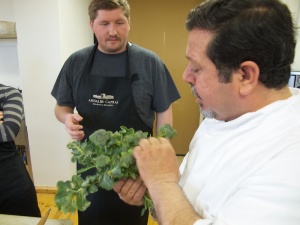 Salvatore, an incredibly charismatic Sicilian welcomed our group – Suzy and I and our friends from Western North Carolina who are visiting for several days. Salvatore greeted each one personally, asking their names and working out the difficult pronunciations. Within minutes he was addressing everyone by name, including the British couple who were also joining our group.
Salvatore, an incredibly charismatic Sicilian welcomed our group – Suzy and I and our friends from Western North Carolina who are visiting for several days. Salvatore greeted each one personally, asking their names and working out the difficult pronunciations. Within minutes he was addressing everyone by name, including the British couple who were also joining our group.
Over the years Salvatore has built an international reputation. He and his Foligno restaurant have been written up in cooking and travel magazines and just last month he was mentioned in a New York Times travel article which dozens of our customers and friends forwarded to us. So it was no surprise that shortly after starting the class a large group clamored into the kitchen, with tripod and professional video gear. A Russian TV crew had come to film Salvatore and to speak with Marco Caprai for a feature on Russian TV. Things like these happen at Salvatore’s cooking class all the time. Last fall when we were cooking with him a delegation of a half dozen Italian men in business suits dropped by half way through the class, turning out to be the mayor of a small town in Puglia and his travelling delegation. Salvatore has star power.
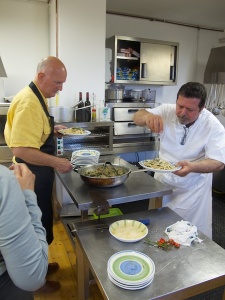 Although he teaches the class in Italian, Salvatore has a pretty good command over English. Besides, he is a natural and gifted communicator, using whatever words he can muster but relying even more on facial expressions and gestures. Our southern friends, who speak no Italian, had no problem understanding what was going on throughout the day. In fact I’m sure they had more difficulty understanding us northerners than they did Salvatore.
Although he teaches the class in Italian, Salvatore has a pretty good command over English. Besides, he is a natural and gifted communicator, using whatever words he can muster but relying even more on facial expressions and gestures. Our southern friends, who speak no Italian, had no problem understanding what was going on throughout the day. In fact I’m sure they had more difficulty understanding us northerners than they did Salvatore.
What’s more, at a cooking class with Salvatore words are not that important. It is less a cooking instruction as it is an opportunity to experience a few hours with Salvatore. That is why we keep coming back. The food, the recipes, the tastes are truly outstanding. But they are, no pun intended, simply gravy. It is the opportunity to watch him work, to experience the joy of cooking (sorry, Irma Rombauer) and to be inspired by him that is the true core of cooking with Salvatore. That was as true yesterday as it has been in the past.
 The theme of yesterday’s class was fame – hunger. Salvatore used fame as the central idea for the ingredients we used in our menu – wild herbs and vegetables that Italians have been picking and using for generations, as a result of the poverty of much of the country. And although we also used domesticated/farmed vegetables in our dishes as well, Salvatore was on a mission to prove to us that right under our very noses there was an incredible bounty of edible delicacies.
The theme of yesterday’s class was fame – hunger. Salvatore used fame as the central idea for the ingredients we used in our menu – wild herbs and vegetables that Italians have been picking and using for generations, as a result of the poverty of much of the country. And although we also used domesticated/farmed vegetables in our dishes as well, Salvatore was on a mission to prove to us that right under our very noses there was an incredible bounty of edible delicacies.
And so while we worked together in the kitchen to make dough for rocciata, a local streudel that we made two varieties of – a savory one stuffed with sautéed chicory and a sweet dessert one stuffed with apple, pear, raisins, pinenuts and other goodies, it was the herb hunting that was the highlight of the day.
With Russian correspondents and camera crew in tow, we went outside and walked down the grass-covered hill that slopes away from the winery, leading down to fields of grapes. Along the hill patches of weeds and tiny wildflowers spouted here and there and within minutes Salvatore, clad in his kitchen whites was on the ground, cutting patches of what appeared to be weeds with a small blade he had brought with him for this purpose and depositing them into a large basket. With each cut, a beaming Salvatore would turn to our group and exclaim what he had found – monk’s beard! red chicory! white chicory! This one, he cried, why a restaurant would pay €100 per kilo for this! These “weeds” are Salvatore’s stock in trade and he uses these types of ingredients as often as possible. At last fall’s class he brought in a basket of grapes that had been growing wild on a wall near the car park in Bevagna. They were the centerpiece of a sausage dish that was stewed in those wild sagrantino grapes. As he noted, every restaurant, from the most humble to the most expensive uses the same ingredients in their salads – domestic arucola, radicchio, mache. Using the wild herbs is instinctive, borne from a survival imperative, connects us to our more humble past and tastes good.
[nggallery id=16]As we sat down to enjoy our rocciata, pasta with wild herbs, a pile of panelle (fried chick pea fritters seasoned with parsley that reminded me of hummus French fries) and salad of wild herbs, we couldn’t help but agree with him.
 But our lunch yesterday was augmented with the addition of another course, grilled lamb, fire baked potatoes slathered with Caprai olive oil and salt and sautéed chard with garlic and una goccia of olive oil. Apparently “a drop” in Sicilian translates into just under a liter. And it was enhanced by the appearance of Marco Caprai, the vineyard’s owner, who met our group in the winetasting room when we returned from our harvesting, pouring wine for us and chatting easily about the cheeses and the local cured meats we were enjoying downstairs while Salvatore finished the second course. It was an unexpected surprise and pleasure.
But our lunch yesterday was augmented with the addition of another course, grilled lamb, fire baked potatoes slathered with Caprai olive oil and salt and sautéed chard with garlic and una goccia of olive oil. Apparently “a drop” in Sicilian translates into just under a liter. And it was enhanced by the appearance of Marco Caprai, the vineyard’s owner, who met our group in the winetasting room when we returned from our harvesting, pouring wine for us and chatting easily about the cheeses and the local cured meats we were enjoying downstairs while Salvatore finished the second course. It was an unexpected surprise and pleasure.
 The whole second act – the Salvatore and Marco show – seemed to echo our good fortune a week earlier when we were taken on a tour and tasting at the Paolo Bea winery by Paolo Bea himself. Bea and Caprai are two of the icons of the Montefalco wine scene and it was my good fortune to sit next to Marco throughout the additional second course. While he was obviously attending to the Russian guests and another special guest, a lovely American woman from Napa that is a distributor of Caprai wines in the U.S., Marco Caprai
The whole second act – the Salvatore and Marco show – seemed to echo our good fortune a week earlier when we were taken on a tour and tasting at the Paolo Bea winery by Paolo Bea himself. Bea and Caprai are two of the icons of the Montefalco wine scene and it was my good fortune to sit next to Marco throughout the additional second course. While he was obviously attending to the Russian guests and another special guest, a lovely American woman from Napa that is a distributor of Caprai wines in the U.S., Marco Caprai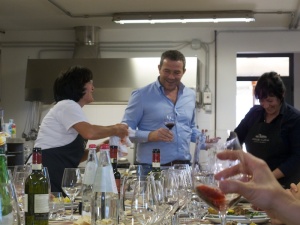 proved himself to be a gracious host, answering our questions about his experience, his wines and the state of the Montefalco D.O.C. Throughout Salvatore would wander to our end of the table joking with Marco and generally cutting up and entertaining the crowd. It was obvious that the two men, who spend a lot of time on the road together promoting Caprai wines and Montefalco, enjoy each other’s company. It was a treat to be able to be part of the afternoon.
proved himself to be a gracious host, answering our questions about his experience, his wines and the state of the Montefalco D.O.C. Throughout Salvatore would wander to our end of the table joking with Marco and generally cutting up and entertaining the crowd. It was obvious that the two men, who spend a lot of time on the road together promoting Caprai wines and Montefalco, enjoy each other’s company. It was a treat to be able to be part of the afternoon.
* * *

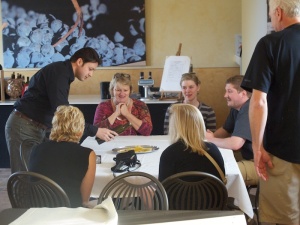 After lunch we decided to make a detour to the Tabarrini winery, one of our very favorites in all of Montefalco. There we had the good fortune of being shown around the winery and having a tasting under the care of Daniele, one of the Tabarrini team at the cantina and a person we have corresponded with recently in connection with our purchases on Tabarrini’s U.S. website. Without doubt, it was one of the best winery tours and tastings we have ever had. Informative, understandable, clear and concise, Daniele has a gift for English and an understanding of the winemaking and wine appreciation process. For two hours we followed him, learned about Giampaolo’s philosophy and winemaking techniques and tasted.
After lunch we decided to make a detour to the Tabarrini winery, one of our very favorites in all of Montefalco. There we had the good fortune of being shown around the winery and having a tasting under the care of Daniele, one of the Tabarrini team at the cantina and a person we have corresponded with recently in connection with our purchases on Tabarrini’s U.S. website. Without doubt, it was one of the best winery tours and tastings we have ever had. Informative, understandable, clear and concise, Daniele has a gift for English and an understanding of the winemaking and wine appreciation process. For two hours we followed him, learned about Giampaolo’s philosophy and winemaking techniques and tasted.
* * *
Later that night, enjoying homemade pizzas from our outdoor pizza oven with our friends from North Carolina and our newly arrived friends from Washington, DC, enjoying a glass (or two) of Tabarrini Montefalco Rosso we had purchased earlier that day we, too, felt that “we must be making this stuff up.” Salvatore, Marco Caprai, Daniele, Tabarrini, friends, Romans, countrymen. This was a day that was so good we couldn’t have even made it up. And we’re only three and a half weeks into an eight week trip.
What to do for an encore?
Ci vediamo!
Bill and Suzy


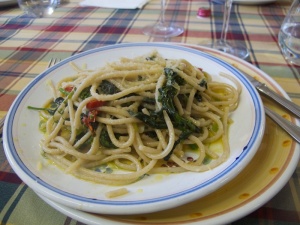


About The Author
Related Posts
A softer version found in Friuli. We're enjoying this small plate at lunch. Good thing…
All about Montefalco Rosso wine